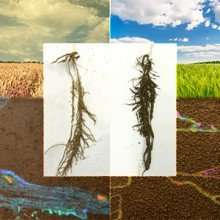Scientists have discovered how bacteria living on wheat roots affect both the plant and the soil in dryland conditions, with the potential to improve agriculture. Foreground: microbial community under dry conditions (left) and microbial community under irrigated conditions (right). Credit: Environmental Molecular Sciences Laboratory
Microbes deep in the soil influence plant health by releasing potent natural antibiotics such as PCA (phenazine-1-carboxylic acid). PCA-producing bacteria thrive on roots of dryland wheat throughout the Columbia Plateau, a major wheat-producing region in central Washington and Oregon, but their role in this important ecosystem was something of a mystery. Now the work of an international team of scientists provides direct evidence for the first time that these bacteria affect not only the wheat, but the soil around it.
Dry areas like the Columbia Plateau suffer large soil losses from wind erosion and plants often struggle to survive droughts. The availability of PCA encourages development of a biofilm that could combat soil degradation by improving water retention. This biofilm also protects the roots from drying out in drought conditions. Most importantly, PCA-producing bacteria enhance long-term soil health by contributing to soil organic matter. Understanding how these bacteria support the ecosystem may prove key to improving agriculture not only in the Columbia Plateau, but in dryland areas around the world.
Researchers set out to discover the mechanisms that control the accumulation of PCA under dryland conditions. Led by Melissa LeTourneau, an Office of Science Graduate Student Research (SCGSR) Fellow at Washington State University, the team included researchers from Pacific Northwest National Laboratory, University of Southern Mississippi, India's Institute of Bioresources and Sustainable Development, U.S. Department of Agriculture Agricultural Research Service, and EMSL, the Environmental Molecular Sciences Laboratory, a U.S. Department of Energy Office of Science user facility. The researchers compared the biofilms on roots inoculated with one strain of PCA-producing bacteria to biofilms on roots lacking PCA-producing bacteria. Examining the samples using a suite of highly advanced microscopes, including EMSL's new-generation ion microprobe (NanoSIMS), helium ion microscope, and focused ion beam/scanning electron microscope, they found PCA promotes biofilm development in dryland root systems and likely influences crop nutrition and soil health in dryland wheat fields. The results fill the gaps in our understanding of dynamics and effect of PCA in dryland agricultural ecosystems.
More information: Melissa K. LeTourneau et al. Phenazine-1-carboxylic acid and soil moisture influence biofilm development and turnover of rhizobacterial biomass on wheat root surfaces, Environmental Microbiology (2018). DOI: 10.1111/1462-2920.14244
Journal information: Environmental Microbiology
Provided by Environmental Molecular Sciences Laboratory






















